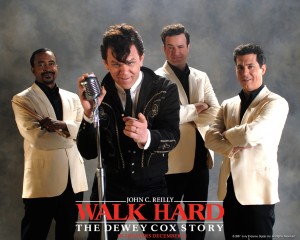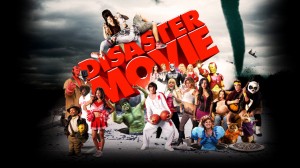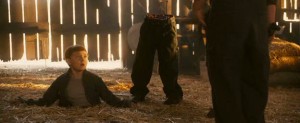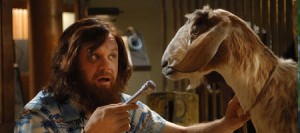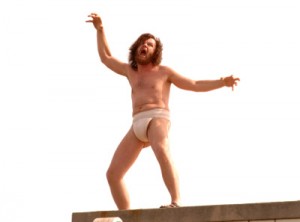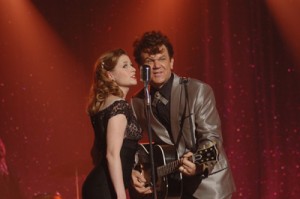100 Film Favorites – #31: Walk Hard: The Dewey Cox Story
(Jake Kasdan, 2007)
“Life’s a race, and I’m in it to win it. And I’ll walk as damn hard as I please.”
In recent years, it has often been said that the art of parody, at least in film, is dead. People frequently cite the films of Jason Friedberg and Aaron Seltzer (Date Movie, Epic Movie, Disaster Movie, etc.) as evidence of the declining quality of film spoofs, with mere allusions to recent pop culture phenomena and “humorously” renamed characters taking the place of actual jokes, wit, or satire.
But parody is not dead, and a few filmmakers still utilize the form expertly. Previous Countdown selection The Cabin in the Woods thoughtfully skewers the conventions of the slasher genre, as does the similarly-themed Tucker and Dale vs. Evil (starring Countdown favorite Alan Tudyk, and highly recommended, though it won’t be appearing on this list). Rather than simply referencing popular films (though this does occur), these movies poke fun at commonalities which apply across the genre itself. We as viewers have grown used to these tropes, and seeing them turned on their head not only makes us laugh, but makes us more aware of the conventions of contemporary storytelling, and more conscious of our film-going practices. Truly great parodies are not only funny, but also genuinely clever and often thought-provoking.
Which brings me to today’s film. Most specifically, Walk Hard is a spoof of the 2005 Johnny Cash biopic Walk the Line, roughly mirroring the plot of that film. However, Walk Hard is a parody more broadly of the biopic genre in general, as well as the history of rock and roll in the second half of the 20th century.
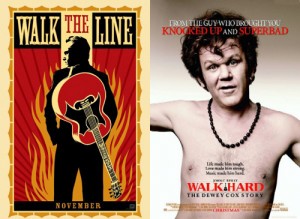
The film follows Dewey Cox (John C. Reilly), a Johnny Cash analog whose music career has spanned both decades and genres. The movie begins just before an aged Cox is scheduled to take the stage for a monumental performance. However, Dewey remains backstage, leaning pensively against a wall, his head on one arm. His bandmates caution the anxious stage manager not to rush him, as “Dewey Cox needs to think about his entire life before he plays.”
Cue a flashback to Dewey’s childhood. Dewey and his younger brother, a multi-talented prodigy, gambol around the family farm, musing about the “long, long, lives” ahead of them while playing a series of outrageously dangerous games (rattlesnake toss, among others). When his brother challenges him to a good old-fashioned machete duel, the young Dewey inadvertently cleaves his sibling in two.
With a cry of “I’m halved!” the younger Cox expires, but not before reminding Dewey that he will now have to be “double great” for the both of them. Distraught by the loss of his Wunderkind son, Dewey’s father adopts an oft-repeated mantra: “The wrong kid died!” The trauma of it all renders Dewey “smell-blind,” unable to sense scents. Amidst all this heartache and smell-loss, Dewey takes up blues guitar and proves a natural.
Years later, a 14-year old Dewey (now played by Reilly) debuts a new song, “Take My Hand,” at the high school talent show. Though the lyrics are seemingly innocuous, the song infuriates the town’s older generation, while simultaneously sparking a fiery passion in the spirits of the young (girls strip to their bras, and a boy punches a priest). To escape threats from people labeling his rock and roll “devil’s music,” Dewey leaves town with a girl who soon becomes his first wife.
A few years pass, and Dewey is busing tables at a nightclub with primarily African-American clientele. One night, the star singer and guitarist (Craig Robinson) is unable to perform, and Cox takes the stage in his place. Dewey re-creates the singer’s entire act, including a flawless rendition of “You’ve Got to Love Your Negro Man.” The performance enchants the audience, especially the trio of Jewish executives who “control the industry” and are listening intently in the crowd.
Dewey is whisked away to a recording studio. After an ill-received cover of “That’s Amore,” Dewey decides to play one of his own songs…”Walk Hard.” The song expresses his willingness to strive toward his goals, no matter what obstacles he may encounter. A montage shows the single quickly climbing to massive popularity nationwide (VERY quickly – a young DJ (Jack McBrayer) informs his listeners that the montage took place over just 35 minutes).
I could go on and on recounting this film, as the whole movie is chock-full of gags that make me laugh every time I watch it. Suffice it to say that the “Walk Hard” song kick-starts a storied career, with Dewey and his band releasing one hit album after another. However, fame comes with temptations: Dewey grows distant from his wife and an ever-expanding number of children, and begins experimenting with drugs…pot, cocaine, uppers, downers, LSD, PCP, and virtually every other drug known to man. Cox’s tumultuous life leads him to create innovative music, ranging from punk rock, to Bob Dylan-style protest songs, to bizarre experimental pieces featuring goats, Maori tribesmen, and “a whole army of didgeridoos.”
Dewey’s career likewise brings him into contact with many of rock & roll’s most famous figures, including Buddy Holly, Elvis, and the Beatles. All are played by hilariously miscast celebrity cameos, with Jack Black as Paul McCartney a particular standout (you know he’s Paul McCartney because he keeps telling everyone so).
After Dewey’s relationship with his first wife falls apart, he meets the lovely Darlene Madison (Jenna Fischer). Over many years, Darlene and Dewey slowly build a strong relationship (popping out many an additional child in the process). With Darlene’s help, Dewey is gradually able to overcome his addictions, reconnect with his many offspring, and even regain his sense of smell. In his twilight years, Cox sets about reuniting his band for a farewell concert to repair his image and leave a lasting legacy.
That’s all I’ll say here. Far be it from me to spoil some of the movie’s most hilarious bits. I would rank Walk Hard easily among the funniest films of the past decade. It skillfully mocks aspects of the biopic form (the same actor playing a character at a wide range of ages, Oscar-baity speeches, etc.), and lampoons some of the most legendary figures in pop culture history. On top of that, the film sports an ensemble cast, including numerous cameos by a wide variety of well-known comics.
One final note: The music in the film is honestly very good throughout. Though the lyrics are often humorous (“Let Me Hold You, Midget-Man”), the many songs are all catchy and well-written, with some actually being serious and touching in tone (the final number, “Beautiful Ride,” features Dewey “accepting his mortality,” and makes for a sentimental final chapter of the old rocker’s life.
Walk Hard is endlessly quotable, full of great laughs and equally great music.
See this movie.
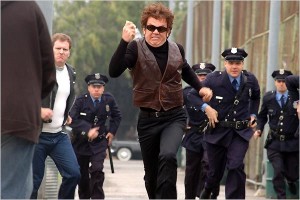 Tidbits:
Tidbits:
-Director Jake Kasdan is the son of Lawrence Kasdan, screenwriter of The Empire Strikes Back, Return of the Jedi, and Raiders of the Lost Ark.
—
Brian Terrill is the host of television show Count Gauntly’s Horrors from the Public Domain. You can keep up with Brian’s 100 Film Favorites countdown here.


